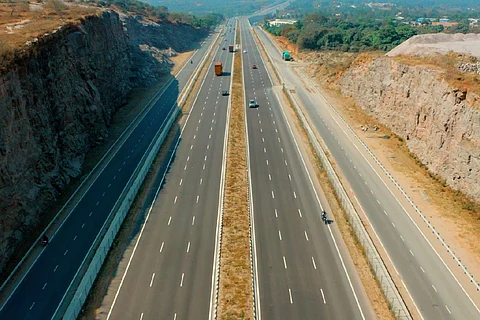

The National Highways Authority of India (NHAI) has said that the recently upgraded Bengaluru-Mysuru road is classified as an access-controlled national highway, not an expressway, contrary to earlier references. NHAI stated that the speed limit on this road is set at 100 kmph, not 120 kmph as is common for expressways.This comes after NHAI banned two-wheelers and three-wheelers such as auto-rickshaws on the Bengaluru Mysuru road from August 1.
NHAI regional officer, Vivek Jaiswal, while speaking to TOI, emphasised that their notifications explicitly specify the road's classification as an access-controlled highway, not an expressway, which might have caused confusion among the public due to its similar design and infrastructure.
Expressways in India are constructed with wider lanes and higher specifications compared to highways, and they have a speed limit of 120 kmph. On the other hand, highways have a maximum speed limit of 100 kmph.
Prime Minister Narendra Modi and Union Minister for Road Transport and Highways, Nitin Gadkari, had previously referred to the Bengaluru-Mysuru road as an expressway before its launch. Furthermore, advertisements by the former BJP government in the state and multiple tweets by NHAI had labeled it as an expressway.
Scenic views of Bengaluru – Mysuru Expressway on NH275 captured through Drone.#PragatiKaHighway #GatiShakti #BengaluruMysuruExpressway
— Nitin Gadkari (@nitin_gadkari) January 29, 2023
Courtesy: Droneman pic.twitter.com/yN2wmNETKI
From Mandya, tomorrow, 12th March, the Bengaluru-Mysuru Expressway would be dedicated to the nation. The foundation stone for the Mysuru-Kushalnagar highway would also be laid. These projects will boost connectivity and socio-economic growth. pic.twitter.com/VC4P0Lau7C
— Narendra Modi (@narendramodi) March 11, 2023
Following the inauguration, NHAI's official Twitter handle had also shared posts referring to it as the "Bengaluru-Mysuru Access-Controlled Expressway." According to TOI, in a recent notification in July, NHAI emphasised the road's classification as an access-controlled highway, stating that high-speed vehicles might pose safety risks to slower-moving vehicles.
NHAI has taken immediate measures to address water drainage issue on the Bengaluru - Mysuru Expressway.#NHAI #Drainage pic.twitter.com/U1uSRD5HwR
— NHAI (@NHAI_Official) March 18, 2023
Plantations by NHAI along the Bengaluru – Mysuru Expressway will not only contribute to environment sustainability, but will also make landscape more pleasing for the commuters. Here is a look at the plantations along the Expressway.#NHAI #GreenInitiatives pic.twitter.com/6u6hzGH6XQ
— NHAI (@NHAI_Official) March 21, 2023
The 118 km long Bengaluru-Mysuru Access-Controlled Expressway will reduce travel time between Bengaluru and Mysuru from 3 hrs to only 75 mins. Being part of the Bharatmala Pariyojana, this expressway features 6 main carriageway lanes and 2 service road lanes on either side.#NHAI pic.twitter.com/tAzVdMixRO
— NHAI (@NHAI_Official) March 14, 2023
What is an access-controlled highway and how is it different from an expressway?
Experts told TNM that access-controlled highways and expressways are often used interchangeably to refer to high-speed roads with limited entry and exit points. These roads are designed for fast and efficient travel, restricting access to designated interchanges or entry/exit ramps. Expressways have superior infrastructure, wider lanes, and limited entry/exit points through interchanges, whereas highways have varying road widths and more access points.
According to Traffic expert MN Sreehari, access controlled simply means that the highway/expressway is restricted to access to pedestrians, bicycles, and slow-moving vehicles or non-motorised traffic. “The roads are access controlled as a measure to combat rising accidents on the road,” he said.
Since its opening to motorists on March 12, the Bengaluru-Mysuru road has witnessed over 100 reported deaths and over 150 severe injuries in more than 308 accidents. TNM had earlier reported that the expressway witnessed 91 deaths since its inauguration in March 2023. Mobility experts attributed three reasons for the surge in accidents to three main factors: overspeeding, poor road design, and lack of driver education.
Pointing out that NHAI has banned two-wheelers and autos on the highway, Sreehari said, “Accidents won’t stop at this level. NHAI or the State highway police should start patrolling the stretches to ensure commuters are not overspeeding.”
The road's objective was to reduce travel time between the two cities from two hours to approximately 75 minutes. The Bengaluru-Mysuru Highway was developed in two phases by the Ministry of Road Transport and Highways with an investment of Rs 9,000 crore by the Union Government.